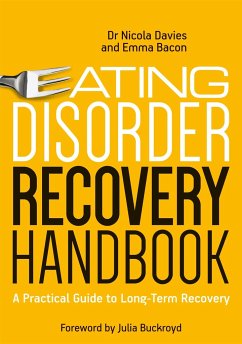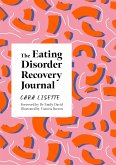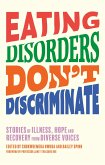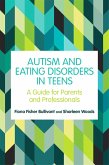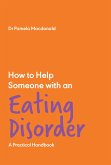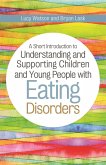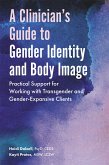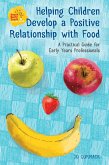- Broschiertes Buch
- Merkliste
- Auf die Merkliste
- Bewerten Bewerten
- Teilen
- Produkt teilen
- Produkterinnerung
- Produkterinnerung
Thoughtfully developed activities will help you to understand, overcome, and maintain recovery from your eating disorder. This complete resource is designed for individual recovery as well as for use in counselling, schools, or self-help groups.
Andere Kunden interessierten sich auch für
![The Eating Disorder Recovery Journal The Eating Disorder Recovery Journal]() Cara LisetteThe Eating Disorder Recovery Journal25,99 €
Cara LisetteThe Eating Disorder Recovery Journal25,99 €![Eating Disorders Don't Discriminate Eating Disorders Don't Discriminate]() Eating Disorders Don't Discriminate20,99 €
Eating Disorders Don't Discriminate20,99 €![Autism and Eating Disorders in Teens Autism and Eating Disorders in Teens]() Fiona Fisher BullivantAutism and Eating Disorders in Teens27,99 €
Fiona Fisher BullivantAutism and Eating Disorders in Teens27,99 €![How to Help Someone with an Eating Disorder How to Help Someone with an Eating Disorder]() Pamela MacdonaldHow to Help Someone with an Eating Disorder14,99 €
Pamela MacdonaldHow to Help Someone with an Eating Disorder14,99 €![A Short Introduction to Understanding and Supporting Children and Young People with Eating Disorders A Short Introduction to Understanding and Supporting Children and Young People with Eating Disorders]() Bryan LaskA Short Introduction to Understanding and Supporting Children and Young People with Eating Disorders25,99 €
Bryan LaskA Short Introduction to Understanding and Supporting Children and Young People with Eating Disorders25,99 €![A Clinician's Guide to Gender Identity and Body Image A Clinician's Guide to Gender Identity and Body Image]() Heidi DalzellA Clinician's Guide to Gender Identity and Body Image39,99 €
Heidi DalzellA Clinician's Guide to Gender Identity and Body Image39,99 €![Helping Children Develop a Positive Relationship with Food Helping Children Develop a Positive Relationship with Food]() Jo CormackHelping Children Develop a Positive Relationship with Food27,99 €
Jo CormackHelping Children Develop a Positive Relationship with Food27,99 €-
-
-
Thoughtfully developed activities will help you to understand, overcome, and maintain recovery from your eating disorder. This complete resource is designed for individual recovery as well as for use in counselling, schools, or self-help groups.
Hinweis: Dieser Artikel kann nur an eine deutsche Lieferadresse ausgeliefert werden.
Hinweis: Dieser Artikel kann nur an eine deutsche Lieferadresse ausgeliefert werden.
Produktdetails
- Produktdetails
- Verlag: Jessica Kingsley Publishers
- Seitenzahl: 240
- Erscheinungstermin: 21. Oktober 2016
- Englisch
- Abmessung: 244mm x 172mm x 20mm
- Gewicht: 498g
- ISBN-13: 9781785921339
- ISBN-10: 1785921339
- Artikelnr.: 45113053
- Herstellerkennzeichnung
- Libri GmbH
- Europaallee 1
- 36244 Bad Hersfeld
- 06621 890
- Verlag: Jessica Kingsley Publishers
- Seitenzahl: 240
- Erscheinungstermin: 21. Oktober 2016
- Englisch
- Abmessung: 244mm x 172mm x 20mm
- Gewicht: 498g
- ISBN-13: 9781785921339
- ISBN-10: 1785921339
- Artikelnr.: 45113053
- Herstellerkennzeichnung
- Libri GmbH
- Europaallee 1
- 36244 Bad Hersfeld
- 06621 890
Dr Nicola Davies is a health psychologist, counsellor, and writer specialising in raising awareness about health and well-being. She is a member of the British Psychological Society and the British Association for Counselling and Psychotherapy. Nicola also keeps a health psychology blog and runs an online forum for counsellors. She is the co-author of the Eating Disorder Recovery Handbook (ISBN 9781785921339), and the author of I Can Beat Obesity! (ISBN 9781785921537) and I Can Beat Anorexia! (ISBN 9781785921872), all published by Jessica Kingsley Publishers. Nicola is a survivor of disordered eating.
Foreword. Endorsements. About the Authors. About This Handbook. 1.
Understanding Eating Disorders. 1.1. Hidden Meanings of an Eating Disorder.
1.2. Motivations for an Eating Disorder. 1.3. Eating Disorder Assessment
and Evaluation Forms. 2. Eating Disorder Comorbidities. 2.1. Eating
Disorders and Obsessive Behaviours. 2.2. Obsessive Compulsive Disorder.
2.3. Ritualistic Behaviours. 2.4. Discussing Depression. 3. Identity and
Eating Disorders. 3.1. Personal Identity. 3.2. Who Am I?. 3.3.
Understanding Your Personality. 3.4. Feeling Worthy. 3.5. Accepting
Yourself. 3.6 Assertiveness. 3.7. The Inner Child. 3.8. Challenging Body
Image Distortion. 3.9. Enhancing a Positive Body Image. 4. Cognitions
(Thoughts) and Eating Disorders. 4.1. Unhelpful Thinking Styles. 4.2. From
Black and White Thinking to Living in Colour. 4.3. Twenty Questions to
Challenge Negative Thoughts. 4.4. Positive Self-Talk. 4.5. Challenging My
Eating Disorder Belief System. 5. Social Aspects of Eating Disorders. 5.1.
Eating Disorders and Relationships. 5.2. Plot Your Close Relationships.
5.3. Family Roles. 5.4. Eating Disorders in the Workplace. 5.5. Positive
Communication. 6. Eating Disorder Recovery - Are You Ready?. 6.1. What
Might Recovery Involve?. 6.2. Readiness to Change. 6.3. The Wheel of Life.
7. Eating Disorder Treatment. 7.1. An Introduction to Counselling. 7.2. An
Introduction to Cognitive Analytical Therapy (CAT). 7.3. An Introduction to
Cognitive Behaviour Therapy (CBT). 7.4. Mirror Therapy. 7.5. Art Therapy.
7.6. Animal Therapy. 7.7. Writing for Recovery. 7.8. Helpful and Unhelpful
Aspects of Eating Disorder Treatment. 8. Self-Help Tools. 8.1. Mood Boards
and Photo Therapy. 8.2. Problem-Solving. 8.3. Worry Time Diary. 8.4.
Managing Anxiety. 8.5. Mindfulness. 8.6. Relaxation Training. 8.7.
Meaningful Music. 8.8. Offering Yourself the Core Conditions. 8.9. External
Validation and Self-Soothing. 8.10. Self-Help Materials. 9. Practical
Advice. 9.1. The Power of Being Pragmatic. 9.2. Restarting Normal Eating.
9.3. Regular, Healthy Eating - Practical Advice. 9.4. Dietary Help for Food
Addictions and Comfort Binge Eating. 9.5. Recognising Hunger. 9.6. Mindful
Eating. 9.7. Exercise Balance. 9.8. Coming off Laxatives. 10. Maintaining
Recovery. 10.1. Self-Sabotage. 10.2. Damage Limitation. 10.3. Relapse
Prevention. 10.4. Aiding Recovery. 10.5. Inspirational Mentors. 11. Looking
to the Future - Beyond Eating Disorders. 11.1. Motivation and Future Goals.
11.2. Hopes and Dreams. 11.3. New Ambitions. 11.4. Recovery Checklist.
Appendices. Appendix A. Appendix B. Appendix C. Appendix D. Appendix E.
Appendix F.
Understanding Eating Disorders. 1.1. Hidden Meanings of an Eating Disorder.
1.2. Motivations for an Eating Disorder. 1.3. Eating Disorder Assessment
and Evaluation Forms. 2. Eating Disorder Comorbidities. 2.1. Eating
Disorders and Obsessive Behaviours. 2.2. Obsessive Compulsive Disorder.
2.3. Ritualistic Behaviours. 2.4. Discussing Depression. 3. Identity and
Eating Disorders. 3.1. Personal Identity. 3.2. Who Am I?. 3.3.
Understanding Your Personality. 3.4. Feeling Worthy. 3.5. Accepting
Yourself. 3.6 Assertiveness. 3.7. The Inner Child. 3.8. Challenging Body
Image Distortion. 3.9. Enhancing a Positive Body Image. 4. Cognitions
(Thoughts) and Eating Disorders. 4.1. Unhelpful Thinking Styles. 4.2. From
Black and White Thinking to Living in Colour. 4.3. Twenty Questions to
Challenge Negative Thoughts. 4.4. Positive Self-Talk. 4.5. Challenging My
Eating Disorder Belief System. 5. Social Aspects of Eating Disorders. 5.1.
Eating Disorders and Relationships. 5.2. Plot Your Close Relationships.
5.3. Family Roles. 5.4. Eating Disorders in the Workplace. 5.5. Positive
Communication. 6. Eating Disorder Recovery - Are You Ready?. 6.1. What
Might Recovery Involve?. 6.2. Readiness to Change. 6.3. The Wheel of Life.
7. Eating Disorder Treatment. 7.1. An Introduction to Counselling. 7.2. An
Introduction to Cognitive Analytical Therapy (CAT). 7.3. An Introduction to
Cognitive Behaviour Therapy (CBT). 7.4. Mirror Therapy. 7.5. Art Therapy.
7.6. Animal Therapy. 7.7. Writing for Recovery. 7.8. Helpful and Unhelpful
Aspects of Eating Disorder Treatment. 8. Self-Help Tools. 8.1. Mood Boards
and Photo Therapy. 8.2. Problem-Solving. 8.3. Worry Time Diary. 8.4.
Managing Anxiety. 8.5. Mindfulness. 8.6. Relaxation Training. 8.7.
Meaningful Music. 8.8. Offering Yourself the Core Conditions. 8.9. External
Validation and Self-Soothing. 8.10. Self-Help Materials. 9. Practical
Advice. 9.1. The Power of Being Pragmatic. 9.2. Restarting Normal Eating.
9.3. Regular, Healthy Eating - Practical Advice. 9.4. Dietary Help for Food
Addictions and Comfort Binge Eating. 9.5. Recognising Hunger. 9.6. Mindful
Eating. 9.7. Exercise Balance. 9.8. Coming off Laxatives. 10. Maintaining
Recovery. 10.1. Self-Sabotage. 10.2. Damage Limitation. 10.3. Relapse
Prevention. 10.4. Aiding Recovery. 10.5. Inspirational Mentors. 11. Looking
to the Future - Beyond Eating Disorders. 11.1. Motivation and Future Goals.
11.2. Hopes and Dreams. 11.3. New Ambitions. 11.4. Recovery Checklist.
Appendices. Appendix A. Appendix B. Appendix C. Appendix D. Appendix E.
Appendix F.
Foreword. Endorsements. About the Authors. About This Handbook. 1.
Understanding Eating Disorders. 1.1. Hidden Meanings of an Eating Disorder.
1.2. Motivations for an Eating Disorder. 1.3. Eating Disorder Assessment
and Evaluation Forms. 2. Eating Disorder Comorbidities. 2.1. Eating
Disorders and Obsessive Behaviours. 2.2. Obsessive Compulsive Disorder.
2.3. Ritualistic Behaviours. 2.4. Discussing Depression. 3. Identity and
Eating Disorders. 3.1. Personal Identity. 3.2. Who Am I?. 3.3.
Understanding Your Personality. 3.4. Feeling Worthy. 3.5. Accepting
Yourself. 3.6 Assertiveness. 3.7. The Inner Child. 3.8. Challenging Body
Image Distortion. 3.9. Enhancing a Positive Body Image. 4. Cognitions
(Thoughts) and Eating Disorders. 4.1. Unhelpful Thinking Styles. 4.2. From
Black and White Thinking to Living in Colour. 4.3. Twenty Questions to
Challenge Negative Thoughts. 4.4. Positive Self-Talk. 4.5. Challenging My
Eating Disorder Belief System. 5. Social Aspects of Eating Disorders. 5.1.
Eating Disorders and Relationships. 5.2. Plot Your Close Relationships.
5.3. Family Roles. 5.4. Eating Disorders in the Workplace. 5.5. Positive
Communication. 6. Eating Disorder Recovery - Are You Ready?. 6.1. What
Might Recovery Involve?. 6.2. Readiness to Change. 6.3. The Wheel of Life.
7. Eating Disorder Treatment. 7.1. An Introduction to Counselling. 7.2. An
Introduction to Cognitive Analytical Therapy (CAT). 7.3. An Introduction to
Cognitive Behaviour Therapy (CBT). 7.4. Mirror Therapy. 7.5. Art Therapy.
7.6. Animal Therapy. 7.7. Writing for Recovery. 7.8. Helpful and Unhelpful
Aspects of Eating Disorder Treatment. 8. Self-Help Tools. 8.1. Mood Boards
and Photo Therapy. 8.2. Problem-Solving. 8.3. Worry Time Diary. 8.4.
Managing Anxiety. 8.5. Mindfulness. 8.6. Relaxation Training. 8.7.
Meaningful Music. 8.8. Offering Yourself the Core Conditions. 8.9. External
Validation and Self-Soothing. 8.10. Self-Help Materials. 9. Practical
Advice. 9.1. The Power of Being Pragmatic. 9.2. Restarting Normal Eating.
9.3. Regular, Healthy Eating - Practical Advice. 9.4. Dietary Help for Food
Addictions and Comfort Binge Eating. 9.5. Recognising Hunger. 9.6. Mindful
Eating. 9.7. Exercise Balance. 9.8. Coming off Laxatives. 10. Maintaining
Recovery. 10.1. Self-Sabotage. 10.2. Damage Limitation. 10.3. Relapse
Prevention. 10.4. Aiding Recovery. 10.5. Inspirational Mentors. 11. Looking
to the Future - Beyond Eating Disorders. 11.1. Motivation and Future Goals.
11.2. Hopes and Dreams. 11.3. New Ambitions. 11.4. Recovery Checklist.
Appendices. Appendix A. Appendix B. Appendix C. Appendix D. Appendix E.
Appendix F.
Understanding Eating Disorders. 1.1. Hidden Meanings of an Eating Disorder.
1.2. Motivations for an Eating Disorder. 1.3. Eating Disorder Assessment
and Evaluation Forms. 2. Eating Disorder Comorbidities. 2.1. Eating
Disorders and Obsessive Behaviours. 2.2. Obsessive Compulsive Disorder.
2.3. Ritualistic Behaviours. 2.4. Discussing Depression. 3. Identity and
Eating Disorders. 3.1. Personal Identity. 3.2. Who Am I?. 3.3.
Understanding Your Personality. 3.4. Feeling Worthy. 3.5. Accepting
Yourself. 3.6 Assertiveness. 3.7. The Inner Child. 3.8. Challenging Body
Image Distortion. 3.9. Enhancing a Positive Body Image. 4. Cognitions
(Thoughts) and Eating Disorders. 4.1. Unhelpful Thinking Styles. 4.2. From
Black and White Thinking to Living in Colour. 4.3. Twenty Questions to
Challenge Negative Thoughts. 4.4. Positive Self-Talk. 4.5. Challenging My
Eating Disorder Belief System. 5. Social Aspects of Eating Disorders. 5.1.
Eating Disorders and Relationships. 5.2. Plot Your Close Relationships.
5.3. Family Roles. 5.4. Eating Disorders in the Workplace. 5.5. Positive
Communication. 6. Eating Disorder Recovery - Are You Ready?. 6.1. What
Might Recovery Involve?. 6.2. Readiness to Change. 6.3. The Wheel of Life.
7. Eating Disorder Treatment. 7.1. An Introduction to Counselling. 7.2. An
Introduction to Cognitive Analytical Therapy (CAT). 7.3. An Introduction to
Cognitive Behaviour Therapy (CBT). 7.4. Mirror Therapy. 7.5. Art Therapy.
7.6. Animal Therapy. 7.7. Writing for Recovery. 7.8. Helpful and Unhelpful
Aspects of Eating Disorder Treatment. 8. Self-Help Tools. 8.1. Mood Boards
and Photo Therapy. 8.2. Problem-Solving. 8.3. Worry Time Diary. 8.4.
Managing Anxiety. 8.5. Mindfulness. 8.6. Relaxation Training. 8.7.
Meaningful Music. 8.8. Offering Yourself the Core Conditions. 8.9. External
Validation and Self-Soothing. 8.10. Self-Help Materials. 9. Practical
Advice. 9.1. The Power of Being Pragmatic. 9.2. Restarting Normal Eating.
9.3. Regular, Healthy Eating - Practical Advice. 9.4. Dietary Help for Food
Addictions and Comfort Binge Eating. 9.5. Recognising Hunger. 9.6. Mindful
Eating. 9.7. Exercise Balance. 9.8. Coming off Laxatives. 10. Maintaining
Recovery. 10.1. Self-Sabotage. 10.2. Damage Limitation. 10.3. Relapse
Prevention. 10.4. Aiding Recovery. 10.5. Inspirational Mentors. 11. Looking
to the Future - Beyond Eating Disorders. 11.1. Motivation and Future Goals.
11.2. Hopes and Dreams. 11.3. New Ambitions. 11.4. Recovery Checklist.
Appendices. Appendix A. Appendix B. Appendix C. Appendix D. Appendix E.
Appendix F.

